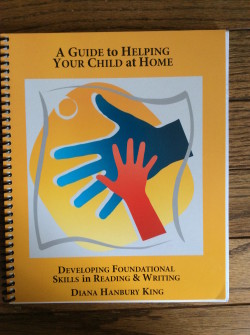Developing Basic Skills in Reading & Writing

by Kathy Kuhl Review of Diana Hanbury King’s A Guide to Helping Your Child at Home: Developing Foundational Skills in Reading & Writing
Suppose you could get one of the best writing teachers, a specialist in helping struggling learners, to come over to help you understand how to teach your child? What if she offered to write it all down? You’d have Diana Hanbury King’s A Guide to Helping Your Child at Home: Developing Foundational Skills in Reading and Writing.
Why Orton-Gillingham, aka Multisensory Structured Language Instruction
Often people ask me for advice when they have a child struggling to read. I recommend that parents choose one of the reading programs based on the Orton-Gillingham approach, also called Multi-Sensory Structured Language (MSL), and hire a specialist trained in it, or get trained themselves. (I wrote an article here about homeschooling parents who’ve received this training.)
(There are programs that merely claim to be based on Orton-Gillingham. The International Dyslexia Association publishes lots of helpful information here, and offers this introduction for teachers (and parent/teachers)
But with this book, you can immediately learn the fundamentals and teach your child reading and writing skills. Of course, some children will need more expert help from a reading specialist with complete training and experience. But for others, this book may be enough, and it looks like the place to start.
Your child doesn’t have to have a disability to benefit. The methods are just good ways to teach most kids.
The book is very practical. Diana King avoids unnecessary complexity, and shows you how to teach the very basics of reading and writing to any child. As she explains,
What drove me to write this guide for parents is recent encounters with middle and high school students with elementary skills – some even at a first or second grade level…. Most reading and writing failure can be prevented by early intervention, even beginning before the child enters first grade. For the 20% of children who have dyslexia or other language-based difficulties, the foundational skills I’ve shared in this text are vital, while the child who shows no signs of dyslexia will soar with knowledge of these skills.
I’m happy to recommend this book, and am pleased to offer it at conventions where I’m speaking this spring. You can also buy it from the publisher. I gain nothing from this, except the satisfaction of helping you find a good resource.

